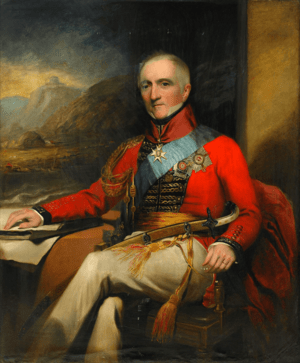Rufane Shaw Donkin facts for kids
Quick facts for kids
Sir
Rufane Shaw Donkin
|
|
|---|---|

Rufane Shaw Donkin
|
|
| Born | 1772 |
| Died | 1 May 1841 (aged 68-69) |
| Allegiance | United Kingdom |
| Service/ |
British Army |
| Rank | Lieutenant-General |
| Battles/wars | |
| Awards | Knight Grand Cross of the Royal Guelphic Order Knight Commander of the Order of the Bath |
Sir Rufane Shaw Donkin (1772 – 1 May 1841) was a brave British army officer. He served during the Napoleonic Wars, a time of big conflicts in Europe. Later in his life, he became a Member of Parliament, which means he helped make laws for his country.
Contents
Who Was Rufane Donkin?
Rufane Donkin came from a family of soldiers. His father, General Robert Donkin, was also a famous army leader. Young Rufane was born in 1772 in Exeter, England. He was named after his father's colonel, William Rufane.
Donkin's Military Career
Rufane Donkin joined the army and quickly moved up in rank. He became a captain in 1793. The next year, he fought in the West Indies. By 1796, he was a major.
Early Battles and Promotions
When he was 25, Donkin became a lieutenant-colonel. In 1798, he led a special group of soldiers called a light battalion. They did very well in an important mission to Ostend.
He also served in Denmark in 1807 during the Copenhagen Expedition. Two years later, he was given command of a large group of soldiers called a brigade. He led them to victory in Portugal at the Second Battle of Porto in May 1809.
The Battle of Talavera
In July 1809, Donkin's brigade was ahead of the main British army. French forces surprised them before they could set up guards. Over 400 British soldiers were hurt. Donkin quickly brought his men back to the main line. He then led his brigade bravely through the rest of the Battle of Talavera.
Service in the Mediterranean and India
After Talavera, Donkin became a quartermaster-general. This meant he helped plan and organize army supplies. He served in the Mediterranean from 1810 to 1813. He took part in missions in Spain.
In 1815, Major-General Donkin went to India. He was a great leader there, helping in battles against the Mahrattas from 1817 to 1818. For his success, he received a special award called the KCB.
Governor of Cape Colony
A sad event happened when Donkin's young wife, Elizabeth Frances, passed away. He took time off and went to the Cape of Good Hope in Africa. From 1820 to 1821, he successfully managed the Cape Colony as the acting Governor.
To remember his wife, he named a growing port city Port Elizabeth in Algoa Bay after her. In August 1820, he built a memorial for her on a hill overlooking the bay. In 1821, he became a lieutenant-general and received another high honor, the Knight Grand Cross of the Royal Guelphic Order.
Life After the Army
After his army career, Donkin spent his time on writing and politics. He was one of the first members of the Royal Geographical Society, which studies geography. He was also part of the Royal Society and other important groups.
He wrote a book about the River Niger in Africa. From 1832 to 1837, he was a Member of Parliament for Berwick-upon-Tweed. In 1835, he became the Surveyor-General of the Ordnance, a role that involved managing military supplies. He was also a general and a colonel of the 11th Regiment of Foot.
Donkin is remembered on the Burdett Coutts Memorial in Old St. Pancras Churchyard in London. His cousin, Charles Collier Michell, also served as a surveyor-general in the Cape Colony.
Images for kids
-
Donkin's name listed on the south face of the Burdett Coutts memorial
See also
- Donkin Heritage Trail
 | Selma Burke |
 | Pauline Powell Burns |
 | Frederick J. Brown |
 | Robert Blackburn |



